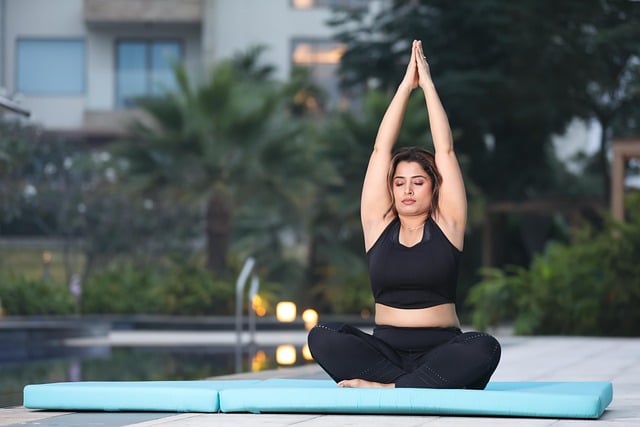Yoga for wellness is a holistic approach to improving overall health by combining physical postures, breathing, and meditation. Establishing a consistent daily routine, including regular bedtimes, rituals, and an optimal sleep environment, enhances relaxation. Pre-bed yoga practices signal to the body and mind that it's time to unwind, reducing stress and facilitating peaceful sleep. By cultivating mindfulness through yoga, individuals can improve sleep quality and overall well-being, making it a beneficial practice for all levels of practitioners.
Looking for better sleep and relaxation? You’re not alone. Quality rest is vital for overall health and well-being. In this article, we explore practical tips to transform your routine and create a peaceful sanctuary for sleep. From understanding the importance of sleep hygiene to incorporating yoga for calming the mind and body, these strategies will help you achieve optimal rest. Discover how to cultivate a sleep-friendly environment that nurtures both tranquility and restorative sleep. Embrace wellness through simple yet effective practices designed to enhance your quality of life.
- Understanding Sleep and Relaxation: The Importance of a Healthy Routine
- Yoga as a Tool for Calming the Mind and Body
- Incorporating Daily Practices for Optimal Rest
- Nurturing a Sleep-Friendly Environment
Understanding Sleep and Relaxation: The Importance of a Healthy Routine

Understanding Sleep and Relaxation: The Importance of a Healthy Routine
Sleep and relaxation are fundamental pillars of overall wellness, deeply intertwined with our physical, mental, and emotional health. In today’s fast-paced world, many people struggle to maintain healthy sleep routines, often leading to chronic fatigue, decreased productivity, and even long-term health issues. Yoga for wellness is a holistic practice that can significantly contribute to improving both sleep quality and relaxation techniques. By combining physical postures, breathing exercises, and meditation, yoga helps calm the mind, reduce stress, and promote deep rest.
A consistent daily routine is key to achieving optimal sleep. This includes maintaining regular bedtimes and wake-up times, creating a soothing bedtime ritual, and optimizing your sleep environment. Incorporating gentle yoga practices before bed can help signal to your body and mind that it’s time to wind down. The slow, controlled movements and mindful breathing exercises associated with yoga can ease tension in the body, quiet racing thoughts, and prepare you for a peaceful night’s rest.
Yoga as a Tool for Calming the Mind and Body

Yoga, an ancient practice focused on connection between mind and body, offers a powerful tool for calming the restless mind and promoting relaxation. Through a combination of physical postures (asanas), breathing techniques (pranayama), and meditation, yoga helps to reduce stress hormones and lower blood pressure, creating a sense of tranquility and peace. The gentle movements and mindful focus encourage a mental shift from chaos to clarity, making it an effective method for cultivating wellness and improving sleep quality.
Incorporating regular yoga practice into your routine can create a sanctuary from the demands of daily life. By allowing yourself to become fully present in each pose and breath, you cultivate a deeper awareness of your body’s needs. This mindfulness translates off the mat, helping you to navigate life’s challenges with greater composure and resilience. Whether you’re a beginner or experienced practitioner, yoga for wellness is accessible and beneficial, offering a path towards better sleep and enhanced overall well-being.
Incorporating Daily Practices for Optimal Rest

Incorporating daily practices that promote relaxation and mindfulness is a game-changer when it comes to achieving optimal rest. A simple yet powerful routine can significantly enhance your overall sleep quality. Activities like yoga, for instance, are not just exercises; they are wellness tools that calm the mind and prepare the body for rest. Just a few minutes of gentle movement and breathing techniques before bed can signal to your body that it’s time to wind down.
Additionally, setting aside dedicated time each day for relaxation can make a profound difference. Whether it’s engaging in a short meditation session, reading a book, or practicing deep breathing exercises, these habits create a sense of calm and prepare you for a peaceful night’s sleep. By integrating such practices into your daily routine, you’ll notice an improvement in both your sleep quality and overall wellness, leaving you refreshed and rejuvenated each morning.
Nurturing a Sleep-Friendly Environment

Creating a sleep-friendly environment is a crucial step in enhancing your rest and relaxation routines. Consider transforming your bedroom into a sanctuary for serenity. Start by keeping the space cool, dark, and quiet—a comfortable temperature between 60–67°F (15–19°C) is ideal for sleeping. Invest in high-quality curtains or blinds to block out any outside light, and use earplugs or a white noise machine if necessary to muffle disturbances. A clean, clutter-free environment can also contribute to better sleep; make it a habit to declutter and ensure your bedroom is a peaceful retreat.
Incorporating yoga for wellness into your daily routine can further promote relaxation and prepare your mind and body for sleep. Gentle yoga poses before bed can help release tension, calm the nervous system, and improve blood circulation, making it easier to unwind and drift off to sleep. Simple stretches like child’s pose or cobra pose are accessible options to try. By creating a soothing atmosphere and incorporating stress-relieving activities like yoga, you’ll be well on your way to achieving deeper and more restful sleep.
Improving sleep and relaxation is a holistic process that involves understanding your body’s needs, adopting practical daily practices, and creating a conducive environment. By incorporating techniques like yoga into your routine, you can achieve a sense of calm and promote better rest. Consistency is key; whether it’s setting regular bedtimes or adopting mindfulness practices, these tips collectively contribute to enhancing your overall wellness through quality sleep.
